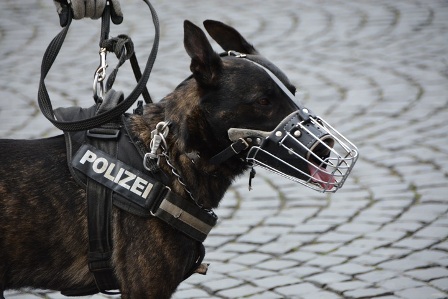Dogs have been used for law enforcement, including warfare, for thousands of years. Police dog training hasn’t always been a priority. Early canines were chosen for strength, endurance, and ferociousness. They were considered as the asset if they didn’t cost money or require special training.
Bulldog and Mastiff type dogs were used in war by Egyptians, Persians, Greeks, Britons, and Romans. They were sentries, guard dogs, and attack dogs. During the Middle Ages, Bloodhounds tracked down outlaws. A Newfoundland accompanied Lewis and Clark on their overland expedition across America.
Soldiers of the American Revolution and the Civil War brought along their dogs as camp guards. Expanded duties during World War I included red cross dogs, messengers, and hauling ammunition.
World War II dogs did all the above and more. They worked as scouts, joining soldiers on patrol, alerting them to enemy soldiers nearby. Japanese dogs guarded warehouses. German dogs guarded prison camps. In America, patriots donated dogs for military service.
In 1859, Belgium officers first used dogs to patrol the streets. Soon thereafter, Germany, France, Austria, and Hungary added dogs to their forces. These early dogs were aggressive; inspiring fear, protecting their handlers, tracking and tackling suspects and guarding evidence. By 1910 Germany had police dogs in over 600 cities.
The United Kingdom followed the trend. Constables were authorized to take their own dogs on patrol in 1914. A few years earlier in 1908, the Northern Eastern Railway was deploying Airedales as guard dogs to prevent theft.
In the United States, local police departments were slow to recognize the benefits. The 1970’s saw the introduction of dogs. Today they work in every city and many rural locales. Often they’re protected with ballistic vests. Laws make it a felony to injure or kill a law enforcement dog. More than 300 Search and Rescue dogs aided the rescue efforts after the September 11 terrorist attack on the World Trade Center.
Besides search and rescue, modern day dogs protect their handlers, apprehend criminals, and detect explosives and narcotics. German Shepherds and Belgium Malinois are popular for guarding and chasing. Some join search and rescue teams. Bloodhounds and Beagles with their superior sense of smell are best at search and rescue and detection of illicit materials.
Europe is the breeder and trainer of choice. A two-year program of obedience, agility and endurance training narrows the field to the best, who then proceed to specialty instruction. To make the cut, a dog must be obedient, trustworthy, intelligent, forceful and strong.
They’re trained to be forceful and intimidating, but not vicious. They’re socialized family dogs who live with their handlers. They don’t know they are chasing criminals. It’s a game to be played on command. Police dog training is ongoing, usually scheduled for eight hours every two weeks, to keep skills sharp and aggression in check.
The fact of the matter is that the breeds of dogs used for police service can viciously inflict serious injuries and even death. If you or a loved one was subject to what you believe is an excessive and unwarranted force and injury due to an overzealous police dog, you need to contact a personal injury lawyer who specializes in dog bites. Ideally, the attorney will be able to prove that your attack was unwarranted and that you are due appropriate compensation for medical treatment and care, lost time at work and possibly pain and suffering

I am a dog lover and creator of this site. I am also the author of ‘Keep Sleeping Keep Missing- if only you knew’ (available on Amazon, Flipkart, Kobo, Google Store, etc.).





My brother suggested I might like this blog. He used to be totally right.
This submit truly made my day. You cann’t consider just how so much time I had spent for this information! Thanks!
Good info. Lucky me I discovered your website by chance (stumbleupon).
I have book-marked it for later!